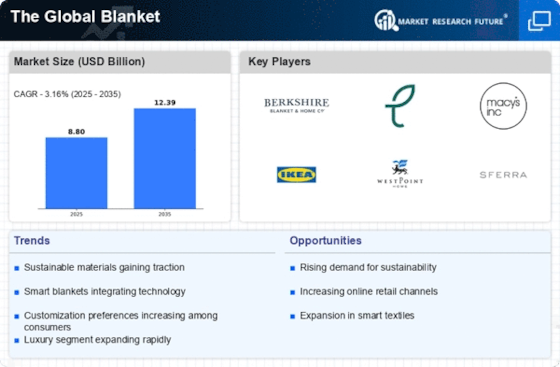Top Industry Leaders in the Blanket Market

The blanket market, catering to a diverse range of consumer needs from warmth and comfort to style and design, is a competitive sector within the textile industry. As of 2023, key players in this market have strategically positioned themselves to address the various demands of consumers, considering factors such as material quality, design aesthetics, and affordability.
Key Players:
Pendleton Woolen Mills
Urbanara
Faribault Woolen Mill Co.
Biddeford Blankets L.L.C.
Hudson's Bay Company
Boll & Branch Co.
American Blanket Company
Shanghai Easun Group
Medline Industries Inc.
Kanata Blanket Company
Jarden Corporation
Beurer GmbH
New Zealand Wool Blankets Ltd.
Barker Textiles
U.A.B. Silkeborg
Morphy Richards Ltd.
Strategies Adopted:
The blanket market deploy various strategies to maintain and enhance their market positions. Product diversification is a common approach, with an emphasis on offering blankets in different materials, sizes, and designs to cater to diverse consumer preferences. Brands often collaborate with designers or influencers to create exclusive collections that attract specific consumer segments. Pricing strategies, including promotional discounts and bundling options, are crucial to address varying customer budgets. Distribution efficiency is another key strategy, with companies ensuring widespread availability through both online and brick-and-mortar retail channels.
Market Share Analysis:
The blanket industry involves considering various factors. Brand reputation is a significant determinant, influencing consumer trust and loyalty. The ability to offer blankets with diverse materials, ranging from cotton and wool to synthetic fibers, is essential for meeting different comfort and style preferences. Pricing competitiveness, quality of materials, and the ability to respond to changing fashion trends contribute to market share dynamics. The efficiency of supply chain management, including manufacturing processes and distribution networks, also plays a crucial role in gaining a larger market share. Additionally, consumer reviews and ratings influence brand perception, affecting market share.
News & Emerging Companies:
The blanket market has witnessed the emergence of new companies focusing on innovative materials, sustainable practices, and unique designs. Emerging companies often leverage digital marketing and e-commerce platforms to establish their presence in a competitive market. News in this industry typically revolves around product launches, collaborations with influencers, and efforts to enhance sustainability by using eco-friendly materials and manufacturing processes.
Industry Trends:
The blanket market often highlights trends in materials, design, and sustainability. Companies are increasingly investing in eco-friendly practices, incorporating recycled materials, and adopting ethical sourcing in response to consumer demand for sustainable home textiles. Current investment trends reveal a focus on digital innovation, with companies investing in e-commerce platforms, augmented reality experiences, and virtual showrooms to enhance the online shopping experience for consumers.
Competitive Scenario:
The blanket market is characterized by a mix of established brands with a long history in the textile industry and emerging companies striving to carve a niche through innovation and sustainability. Established brands often emphasize their heritage, product quality, and extensive distribution networks to maintain market share. Emerging brands focus on differentiation through unique designs, sustainable practices, and direct-to-consumer models. The market also experiences competition based on features, with some brands specializing in electric blankets, while others focus on luxury or organic materials.
The digital transformation of the retail landscape has further intensified the competitive environment. Brands that successfully leverage e-commerce channels, employ effective digital marketing strategies, and optimize the online shopping experience are better positioned to capture market share in a changing consumer landscape.
Recent Development
Vellux, in response to the increasing interest in personalized home decor, introduced a customization feature on its website, allowing customers to design their blankets by choosing materials, colors, and patterns. This development showcased Vellux's commitment to providing consumers with personalized options, addressing the trend of customization and individual expression in home furnishings.
Sunbeam Products, Inc., recognizing the importance of technology in enhancing user experience, invested in smart heating technology for its electric blankets. The incorporation of features such as smartphone connectivity and customizable heating settings reflected the brand's commitment to innovation and meeting the evolving needs of consumers seeking technologically advanced home products.
Cotton Incorporated, as a pivotal player in the raw material supply chain, collaborated with leading blanket manufacturers to promote the use of sustainable cotton farming practices. This collaborative effort aimed to ensure a steady supply of responsibly sourced cotton for the blanket industry, contributing to the overall sustainability goals of the market.











